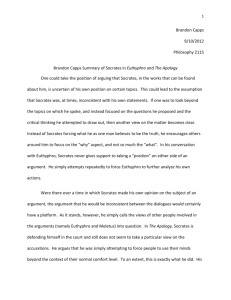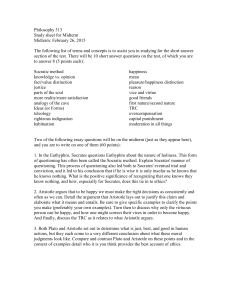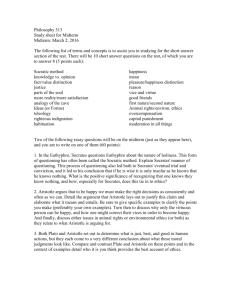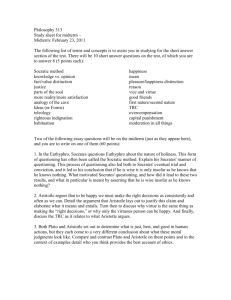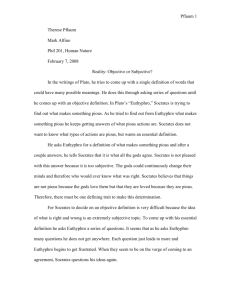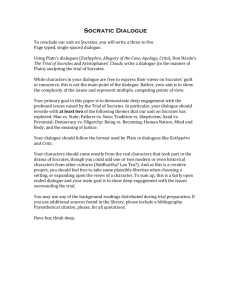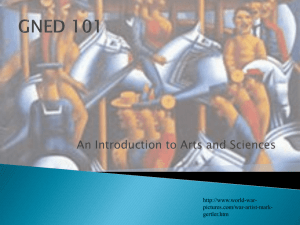lesson 2 Euthyphro and DCT
advertisement
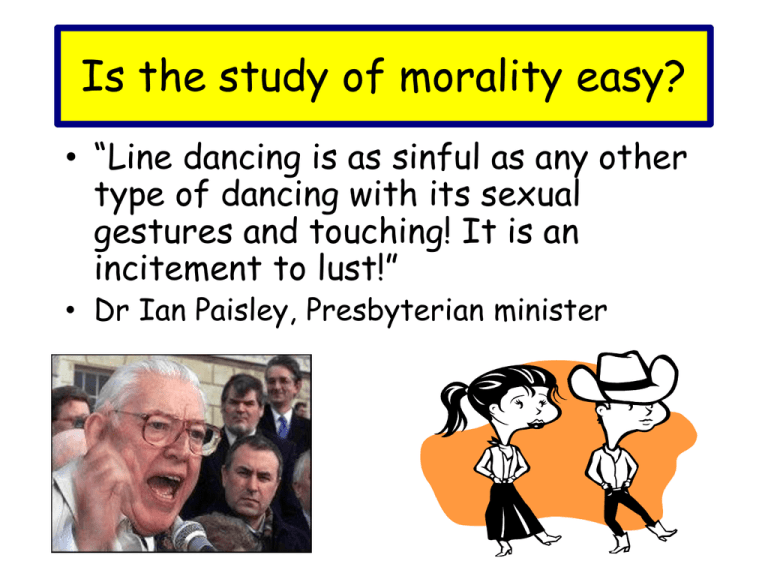
Is the study of morality easy? • “Line dancing is as sinful as any other type of dancing with its sexual gestures and touching! It is an incitement to lust!” • Dr Ian Paisley, Presbyterian minister Socrates: a biography • Born 469BCE in Athens, Greece. • No recorded works yet one of history’s most influential philosophers. • We know of Socrates through the writings of his student Plato. • Often described as rotund and ugly, he was known for talking to anyone and engaging them in philosophical debate. • His commitment to philosophy meant that personal hygiene came second place- he was often barefoot and dirty and had very few possessions. Socrates: a biography Socrates aim was not to tell others the truth – he often claimed to be ignorant of it himself – but rather to help them discover it for themselves as best they could. Socrates and Euthyphro We are going to be learning about a very famous argument in moral thinking between Socrates and Euthyphro. We know about it from Plato’s writing in The Last Days of Socrates. It is a made up conversation. It all kicked off when Socrates asked Euthyphro what he thought was ‘right’ (or ‘holy’ which was one way of describing it in those days). Why Euthyphro? • Euthyphro was taking his father to court for the mistreatment of a slave • Socrates was on trial for the ‘crime’ of stirring up trouble in the city’s youth – he could face the death penalty for this. • Socrates was going to be executed for doing something ‘wrong’ so wanted to find out what ‘wrong’ actually meant. The Euthyphro Dilemma • During the debate Euthyphro suggests that what is right is what the gods would be pleased with. Socrates ends the argument by asking Euthyphro do the gods command what is right because it is right or is it right only because the gods command it. The Dilemma Should religious people do things their god(s) commands them to do even if they otherwise think what they’re being asked to do is wrong? Or, should they doubt that the command has come from their god(s) if they believe that the command is wrong? Euthyphro’s Problem • Suppose Euthyphro was hanging about and hears a godlike voice telling him to kill the next person who passes him. He is convinced he has heard the voice of god(s) and he has been brought up always to obey the commands of god(s), because they only command what’s right. Should he kill? • Even if he thinks it is wrong (which he does) surely god(s) wouldn’t command it if it was wrong? Discussion • If there was such a thing as god(s) do you think he/she/it/they would command you to do something which was wrong? Morality and Killing Is killing right or wrong? Would god(s) command it? This depends on who you ask… Some people say that ‘no killing’ is an absolute rule – it never wavers and always applies. Other people say that ‘no killing’ depends on lots of things and so it is a relative rule – it depends on the situation. Time Out: Think, Pair and Share Is there anything which you think is always wrong no matter what? Or, is what’s right and wrong related to the situation? Some possible responses! It is wrong in theory to kill, but sometimes the situation demands it. It is wrong in theory to kill and so it is wrong to do it no matter what the situation. It is theoretically right to kill in certain situations and so right to actually do so. It is theoretically right to kill in certain situations but is actually wrong to do so. • NB: this also applies to those who have viewpoints independent from religious beliefs. Discussion Is it more important to do the right thing if you believe in an afterlife? Recap: • What is the Euthyphro Dilemma? Homework • Explain the Euthyphro dilemma and outline flaws in the argument. 6AE • Homework task 2 – Summarise the Divine Command Theory and the modern approach to it. 6KU Divine Command Theory Divine Command Theory: you should follow all commands you are given from god(s) without question. Euthyphro’s dilemma raised the issue of how god(s) are linked to right and wrong. Most religions today think their god(s) are perfectly good meaning that they always do what is good and expect the same from followers (often with use of the carrot and stick). So how do religious people ‘hear’ from their god(s)? Directly as a voice/vision or a sense of presence. Indirectly through the interpretation of something that happened. An answer to a prayer. The study of sacred texts. The teachings of a member of the faith group. Historical teachings. And can these ways be trusted? No easy answer • For religious people finding out what’s ‘right’ and ‘wrong’ is a complex matter. Some choose to cross-check a few features of their faith together to find answers. • What religious people do with what they think god(s) is telling them is related to two further key ideas in moral-decision making we’ll be learning about: Autonomy and Heteronomy. Time Out: Think, Pair and Share What makes something good? Outcome? Intention? Something else? • Discussion between Euthyphro and Socrates • Euthyphro’s position: whatever the gods (God) command is obligatory just because they command it • Socrates position: there is a standard of goodness independent of the gods (God). The gods (God) no longer the standard of morality. • Is a thing (eg murder) wrong because God says it is wrong, or is it wrong in itself, independent of God? • Basic gist of the Dilemma : • Do morals come from God • If not, where do they come from? Divine Command Theory • Implication of the Euthyphro dilemma is that something is right because God commands it. • Religious people say that God is all powerful as well as perfectly good, so anything He commands should be obeyed and should be thought of as right. The Last Days of Socrates • Socrates never found a solution to the Euthyphro dilemma and what makes something ‘right’ or ‘wrong’. • The Athens court could not explain what ‘right’ or ‘wrong’ were either, but nevertheless Socrates was sentenced to death. Socrates: a biography • The trial and execution of Socrates, dramatized by Plato, has inspired many thinkers and artists through the centuries. • Considered to be a dangerous and subversive influence, he was eventually arrested and charged with refusing to acknowledge the gods of the state, introducing new ones and corrupting the young. Socrates: a biography • Socrates was condemned to death by drinking hemlock, he refused a chance to escape and, surrounded by his friends, embraced death with great dignity. • Socrates died in 399BCE, Athens. The Death of Socrates, by Jacques-Louis David (1787). Plato Following the execution of Socrates Plato left Athens in disgust. He travelled in Italy, Sicily and Egypt before returning to Athens to found his Academy in 377BCE. The Academy was the Western’s world’s first university. Many great intellectuals were schooled there, including Aristotle. Absolute and Relative Viewpoints Any viewpoint, religious, philosophical ,or otherwise, can be either absolute or relative: Absolute Relative •Some things are always right and others are always wrong •Moral rules would be stuck to, regardless of consequences •E.g. if it is ‘wrong to lie’ you would always be honest, even if it hurt someone’s feelings or got you into trouble. •Each situation is different, so should be handled differently. •Moral rules are a guide to be interpreted. •E.g. If it is ‘wrong to lie’ then you would be honest most of the time, but might tell a ‘white lie’ if it would make someone feel better and cause no real harm.
